Chem 2 lab 3 - Study guides, Class notes & Summaries
Looking for the best study guides, study notes and summaries about Chem 2 lab 3? On this page you'll find 360 study documents about Chem 2 lab 3.
Page 3 out of 360 results
Sort by
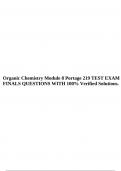
-
Organic Chemistry Module 8 Portage 219 TEST EXAM FINALS QUESTIONS WITH 100% Verified Solutions.
- Exam (elaborations) • 20 pages • 2024
-
- $11.99
- + learn more
Organic Chemistry Module 8 Portage 219 TEST EXAM FINALS QUESTIONS WITH 100% Verified Solutions. Polymer large molecule made by repetitive linking of smaller units (monomers) Macromolecule very large molecule composed of thousands of covalently bonded atoms (ex: polymer) 1. natural (in nature) 2. synthetic (in lab) two ways polymers are made rubber, carbs: starch & cellulose, proteins, nucleic acids DNA, RNA natural polymers nylon, teflon, styrofoam, polyethylene, Dacron, synthetic pol...
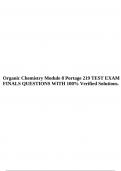
-
Organic Chemistry Module 8 Portage 219 TEST EXAM FINALS QUESTIONS WITH 100% Verified Solutions.
- Exam (elaborations) • 20 pages • 2024
-
- $11.99
- + learn more
Organic Chemistry Module 8 Portage 219 TEST EXAM FINALS QUESTIONS WITH 100% Verified Solutions. Polymer large molecule made by repetitive linking of smaller units (monomers) Macromolecule very large molecule composed of thousands of covalently bonded atoms (ex: polymer) 1. natural (in nature) 2. synthetic (in lab) two ways polymers are made rubber, carbs: starch & cellulose, proteins, nucleic acids DNA, RNA natural polymers nylon, teflon, styrofoam, polyethylene, Dacron, synthetic pol...
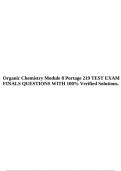
-
Organic Chemistry Module 8 Portage 219 TEST EXAM FINALS QUESTIONS WITH 100% Verified Solutions.
- Exam (elaborations) • 20 pages • 2024
-
- $11.99
- + learn more
Organic Chemistry Module 8 Portage 219 TEST EXAM FINALS QUESTIONS WITH 100% Verified Solutions. Polymer large molecule made by repetitive linking of smaller units (monomers) Macromolecule very large molecule composed of thousands of covalently bonded atoms (ex: polymer) 1. natural (in nature) 2. synthetic (in lab) two ways polymers are made rubber, carbs: starch & cellulose, proteins, nucleic acids DNA, RNA natural polymers nylon, teflon, styrofoam, polyethylene, Dacron, synthetic pol...
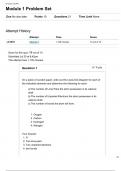
-
CHEM 219 Module 1 Problem Set Principles of Organic Chemistry with Lab Gallaher Portage Learning.
- Exam (elaborations) • 18 pages • 2024
- Available in package deal
-
- $11.99
- + learn more
CHEM 219 Module 1 Problem Set Principles of Organic Chemistry with Lab Gallaher Portage Learning. Score for this quiz: 10 out of 10 Submitted Jul 25 at 8:42pm This attempt took 1,135 minutes. Question 1 0 / 0 pts Your Answer: On a piece of scratch paper, write out the Lewis Dot Diagram for each of the indicated elements and determine the following for each: a) The number of Lone Pairs the atom possesses in its valence shell. b) The number of Unpaired Electrons the atom possesses in its...
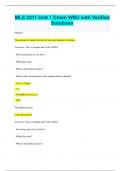
-
MLS 2211 Unit 1 Chem WSU with Verified Solutions
- Exam (elaborations) • 25 pages • 2024
-
- $9.99
- + learn more
MLS 2211 Unit 1 Chem WSU with Verified Solutions Dilution The amount of sample divided by the total amount of solution You have 1 mL of sample and 4 mL of H2O - How many parts do you have? - Whats the ratio? - What is the dilution factor? - What is the concentration of the sample after its diluted? - (4+1) = 5 parts - 1:5 - The dultion factor is 5 - 0.20 The dilution factor is the deminator 5 You have 5 mL of sample and 5 mL of H2O - how many parts do you have? - Whats the r...
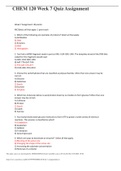
-
CHEM 120 Coursework Altogether Unit 1 – 8 (BUNDLE) | 100% CORRECT SOLUTION.
- Package deal • 48 items • 2022
-
- $17.49
- 3x sold
- + learn more
CHEM 120 Unit 1 Connect Assignment CHEM-120 Unit 1 Lab: OL Lab 1: Chemistry Safety CHEM 120 Unit 1 Lab: OL Lab 2: Atomic Structure: Assess the Possibility of Life on Other Planets CHEM-120 Unit 1 Discussion: Scientific Method and Atomic Structure CHEM 120 Unit 1 Quiz (100% Correct Solutions) CHEM 120 Unit 2 Lab: OL Lab 3: Periodic Table of Element
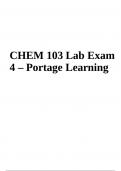
-
CHEM 103 Lab Exam 1 Questions With Answers Latest, CHEM 103 Lab Exam 2 Questions and Answers, CHEM 103 Lab Exam 3, CHEM 103 Lab Exam 4 Questions With Answers, CHEM 103 Lab Exam 5, CHEM 103 Lab Exam 6 & CHEM 103 Lab Exam 8 Questions and Answers | Latest Up
- Package deal • 7 items • 2024
-
- $28.49
- + learn more
CHEM 103 Lab Exam 1 Questions With Answers Latest, CHEM 103 Lab Exam 2 Questions and Answers, CHEM 103 Lab Exam 3, CHEM 103 Lab Exam 4 Questions With Answers, CHEM 103 Lab Exam 5, CHEM 103 Lab Exam 6 & CHEM 103 Lab Exam 8 Questions and Answers | Latest Update 2024/2025 (Portage Learning)
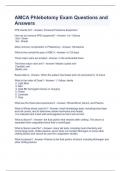
-
AMCA Phlebotomy Exam Questions and Answers
- Exam (elaborations) • 2 pages • 2023
-
- $8.49
- 1x sold
- + learn more
PPE stands for? - Answer- Personal Protective Equipment How do you remove PPE equipment? - Answer- 1st - Gloves 2nd - Gown 3rd - Shield Most common complication in Phlebotomy - Answer- Hematoma What is the normal life span of RBC's - Answer- is 120 days Three major veins are located - Answer- in the antecubital fossa The three major veins are? - Answer- Median cubital vein Cephalic vein Basilic vein Basal state is - Answer- When the patient has fasted and not excersice...
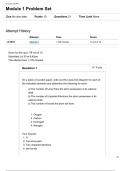
-
CHEM 219 Module 1 Problem Set Principles of Organic Chemistry with Lab Gallaher Portage Learning.
- Exam (elaborations) • 18 pages • 2024
- Available in package deal
-
- $12.99
- + learn more
CHEM 219 Module 1 Problem Set Principles of Organic Chemistry with Lab Gallaher Portage Learning. Score for this quiz: 10 out of 10 Submitted Jul 25 at 8:42pm This attempt took 1,135 minutes. Question 1 0 / 0 pts Your Answer: On a piece of scratch paper, write out the Lewis Dot Diagram for each of the indicated elements and determine the following for each: a) The number of Lone Pairs the atom possesses in its valence shell. b) The number of Unpaired Electrons the atom possesses in its...
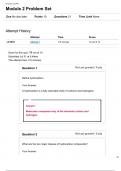
-
CHEM 219 Module 2 Problem Set Principles of Organic Chemistry with Lab Gallaher Portage Learning.
- Exam (elaborations) • 16 pages • 2024
- Available in package deal
-
- $11.99
- + learn more
CHEM 219 Module 2 Problem Set Principles of Organic Chemistry with Lab Gallaher Portage Learning. Score for this quiz: 10 out of 10 Submitted Jul 31 at 5:44pm This attempt took 110 minutes. Question 1 Not yet graded / 0 pts Your Answer: Define hydrocarbon. A hydrocarbon is a fully saturated chain of carbons and hydrogens Answer: Molecules composed only of the elements carbon and hydrogen. Question 2 Not yet graded / 0 pts Your Answer: What are the two major classes of hydrocarbon co...

How did he do that? By selling his study resources on Stuvia. Try it yourself! Discover all about earning on Stuvia


